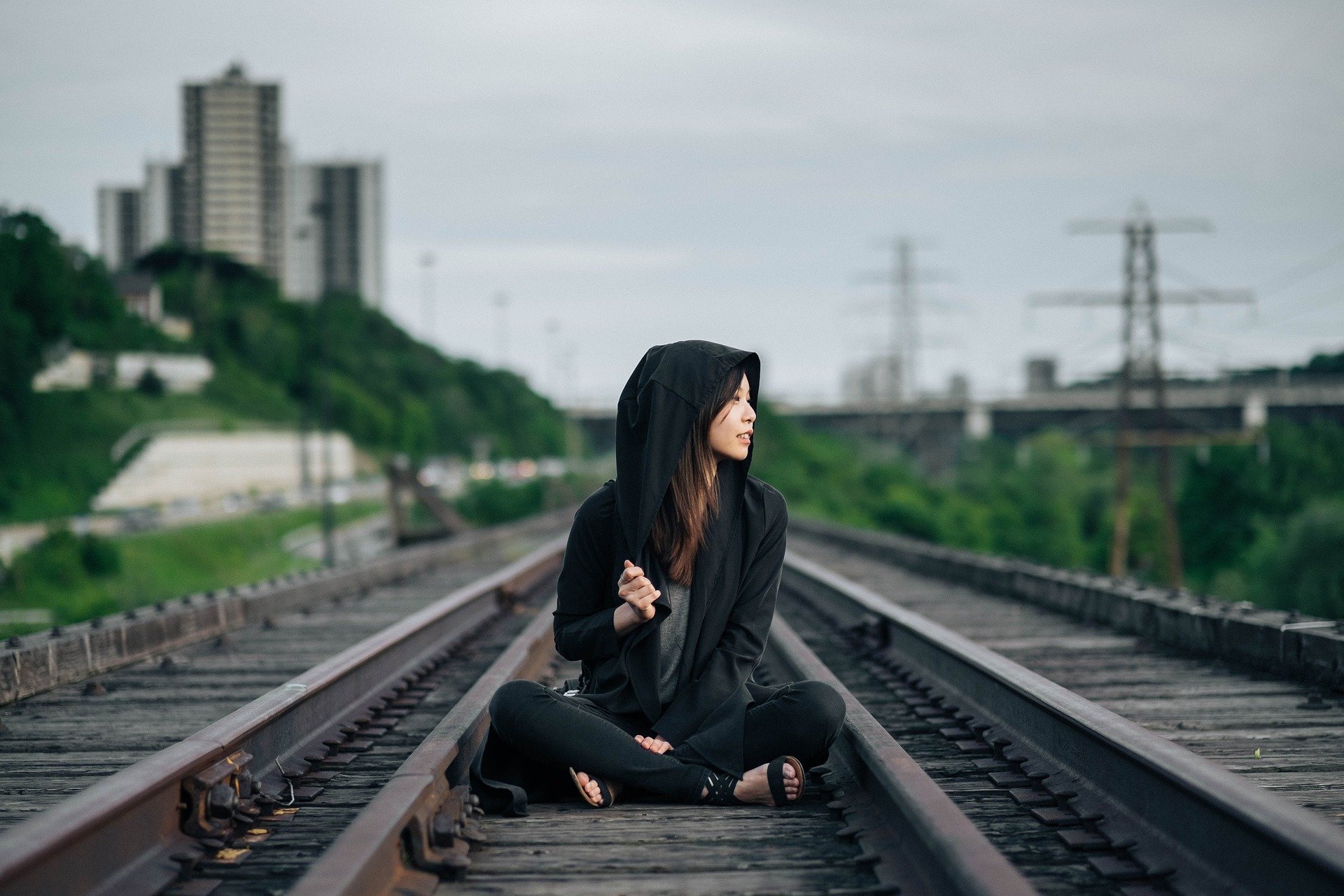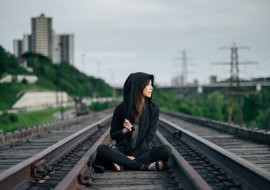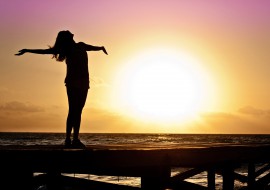
Covid 19 blog #12: can you take a risk? Dare you eat a peach?
“Do I dare disturb the universe? /Shall I part my hair behind? /Do I dare to eat a peach?” T.S. Eliot The Love Song of J. Alfred Prufrock
“And the day came when the risk to remain tight in a bud was more painful than the risk it took to blossom.” Anais Nin (quote found in Elizabeth Lesser’s book Broken Open)
Week 10 of lockdown. 10 weeks of being in, adapting to, well, what exactly? What is this thing we’re in, really? And more importantly, how do we get out of this? Do we need to take a risk?
I went to the supermarket this morning for some essential nonessentials, you know just exercising my freedom as a boomer consumer. I had a lovely chat with a staff member who said “me mams 91; I thought, well she’s been isolated now for all this time, so I took her to the beach. We looked at the sea and I got her a magnum. She loved it. I mean you canna be sure, but it was lovely and I got her home alright.” Before I left the supermarket I picked up a bottle of coke. In the impossible to socially distance aisle filled with around 7 people, a woman looked at me then suddenly flattened her body to the shelves. To her, I guess, I posed a real and present risk. A threat.
For some the staff members action might seem idiotic (covidiot! they will cry) and yet for others it will appear timid and they will suggest her mum does more, gets out more, socialises. Who is right? How do we know what risks are right? You canna be sure, or can you? Risk plays out in other contexts too, with its accompanying support and judgment. For example, the case of Dominic Cummings travelling hundreds of miles from the south with his son after developing coronavirus symptoms[1]. Risk? Stupidity? Hypocrisy? Perfectly legal? You choose.
The changes that we have experienced and have-to a greater or lesser extent-settled into are quite subtle at times and at times quite profound. In The Guardian Susie Orbach writes “We are learning a whole new etiquette of bodies. We swerve around each other, hop into the near-empty street, calculate distances at entrances to parks, avoid body contact, even eye contact, and keep a look out for those obliviously glued to their phones, whose lack of attention threatens to breach the two-metre rule. It’s odd and disconcerting and isn’t quite second nature”.[2] Once the message (whatever the message) has soaked into our bodies it’s became deeply internalised; the unconscious takes over and we operate not from a reflective space but from an automatic, habitually driven and compressed domain. You have to wonder what purpose this might serve, to have us all that unconsciously fearful.
In a piece on spiked online[3] it is reported that “Boris Johnson recently joked with his colleagues, saying: “‘I’ve learnt that it is much easier to take people’s freedoms away than give them back.’” That isn’t funny. The use of terror to cow much of the public, decimate economic life and suspend everyday liberty is not a joking matter. Terror has consequences.”
It is much easier to take peoples freedoms away than give them back. The throw away comment is in fact a profound statement on the conditioning that we surrender to as human beings, our capacity to be drawn into and habitually attach to fear driven and self-protective narratives: save, protect, stay, alert.
Two years ago, I was working with a number of male clients whose experience of dating caused me to reflect on the nature of risk and risk taking. Rob (not his real name) was 18 and had been in a romantic relationship with his girlfriend for over a year. They had both been each other’s firsts and after losing her virginity his girlfriend appeared to have second thoughts and ended the relationship. They tried to reconcile, dated for a few weeks and when they went out for a meal to celebrate her 18th birthday, she looked up to him and he bent towards her to kiss her. Her hand swept up, “that’s assault” she said, and walked out. His risk had failed. Another client, Joel, (again, not his real name) was 27 and still a virgin. He felt unable to undertake any form of physical contact on a date, since he believed this was tantamount to male privilege and “sexist abuse” and when I explored the notion of risk taking, he recoiled in horror (“that’s a bit rapey” he said to me).
We are learning a whole new etiquette of bodies.
When you take a risk, it just might blow up in your face; when you do not take a risk, you might stay in the very place you are in. Forever. What to do?
A year ago, I spoke on BBC radio about the plight of contemporary couple’s low drive in their sexual relationships and introduced the shadow side of consent culture[4], that because everything has a shadow i.e. another side, that young men now are sometimes becoming sexually risk averse, fearful of being called a rapist post intercourse if women subsequently withdraw consent, which is a lose/lose situation for both sexes. This subject is covered in extensive detail in the books The Coddling of the American Mind by Greg Lukianoff and Jonathan Haidt and The Rise of Victimhood Culture by Bradley Campbell and Jason Manning. The BBC presenter suggested that it was most important for all of us to be risk averse; I disagreed, saying we need to be risk aware, to be risk averse shrivels our lives and allows us to live (if we can call it that) only in fear. We remain tight in bud.
The Belgian psychotherapist Esther Perel[5] uses the metaphor of anchors and waves to illustrate the importance of risk in healthy couple relationships-and hence of life itself, since relate is what we all do: anchors are safety seeking activities, waves are risk taking ones. She writes “The challenge for modern couples lies in reconciling the need for what’s safe and predictable with the wish to pursue what’s exciting, mysterious, and awe-inspiring.” We desperately need to reconcile our lockdown anchors and waves in a skilful, healthy manner, or our ship will either sink or never leave harbour again.
In The Spectator this week (23/05/20) Susan Hill writes “a neighbour told me she will probably never go out again because she is simply too terrified. She is just 60, and in good health. [ ] we have been systematically terrified about our age, our weight, every conceivable health issue, as well as conditioned to look upon everyone in the street, running or cycling past or in a shop a potential “super spreader”. It is unhealthy, and it will be a very hard habit to break.”
She is just 60.
In The Lonely Crowd the sociologist David Riesman described three ways people can operate from according to their values and beliefs. Most folk are, he states “tradition directed” that is to say they embody the values handed down to them from the society they find themselves in. During times of change and discord people might become what Riesman called “other directed” where they quickly embody new values and beliefs. These new values are most quickly absorbed in moments of crisis or threat. The third category and the smallest is what Riesman called “inner directed,” literally those who do the sometimes-hard job of reflection and inner exploration; those who doubt, challenge and are sceptical. These are the people who have the greatest growth potential. Perhaps herein lies a clue to risk taking: in what sense does being inner directed help (or, of course, hinder)?
Its important to remember that there is no such thing as zero risk, if you do nothing you still risk “doing nothing” and its consequences. Asking for zero risk, asking for government to perpetually guide you is really nothing less that self infantilisation, turning your adult and visceral self in a docile body dominated and other directed; tracked and compliant. If you let somebody manage your risks, they manage your life.
We’ve been presented day after day with threat: the dead, accounts of intensive care units at crisis, people struggling to breathe, loss after loss and lack of PPE, and this Velcros to us and we ruminate on it. It sticks. We allow our anxiety-our threat barometer-to prove, to evidence, that we are in fact in danger, yet the truth is that day in, day out, psychotherapists and counsellors see clients whose danger has long passed yet lives on, stored and energised in memory, identity and self-protection behaviours that reduce them, make them miserable and keep them in a “nervous” nervous system. They can be locked down into a narrative that they don’t even see; it just “is”. The battle is still being fought when the war is long over. We seek certainty, though this might be naïve and foolish for it might never exist, nor in truth have never existed. How much better it might be to have the tools to live with uncertainty and doubt? Wouldn’t that be more adult?
We are going to have run a risk assessment on coming out of lockdown and living with coronavirus in the future, and individuals, families and groups are going to have to weigh up the risks without becoming risk averse, according to reciprocal harms, contexts and lives lived. We are going to have to take intelligent risks and full responsibility for what’s coming up. There will be no safe space for the unaware who are other directed. In the words of Susie Orbach again[6] “we will have to find new ways to live with our fears and discomforts, to overcome Covid-minted social phobias, with what we project on to other people’s bodies and the fears we have about our own vulnerabilities.”
Perhaps the old Native American wisdom story is illustrative here[7] (you have probably heard it before). One day a grandson was talking to his grandfather who said “there are two wolves in my back-yard fighting; one is the wolf of hate and fear, the other is the wolf of love and endeavour” The grandchild looked up “which one will win grandfather?” he asked. The Grandfather looked down and said: “the one I feed”.
We can stay inside our shells and shrivel, we can live anchored forever, or we can, with thought and skill, challenge, risk, learn and grow -we can surf the waves[8], disturb the universe, and we can dare to eat a peach.
[1] https://www.theguardian.com/politics/2020/may/23/dominic-cummings-no-10-accused-of-covering-up-lockdown-breach
[2] https://www.theguardian.com/lifeandstyle/2020/may/07/patterns-of-pain-covid-19-psychotherapy-susie-orbach-bodies?CMP=Share_AndroidApp_Tweet
[3] https://www.spiked-online.com/2020/05/20/the-lockdown-has-done-untold-damage-to-this-country/
[4] See http://mindful-counselling.com/shadow-work-where-will-i-find-my-shadow-what-do-i-do-next-and-who-is-ken-wilber/ and E.g. “Between the idea/And the reality/Between the motion/And the act/Falls the shadow”. T.S. Eliot (again) The Hollow Men
[5] Esther Perel Mating in Captivity
[6] https://www.theguardian.com/lifeandstyle/2020/may/07/patterns-of-pain-covid-19-psychotherapy-susie-orbach-bodies?CMP=Share_AndroidApp_Tweet
[7] https://en.wikipedia.org/wiki/Two_Wolves
[8] Cf Jon Kabat Zinn saying “you cant stop the waves but you can learn to surf” a hallmark statement of mindfulness https://www.youtube.com/watch?v=x76w8zFrHD4





Write a Comment